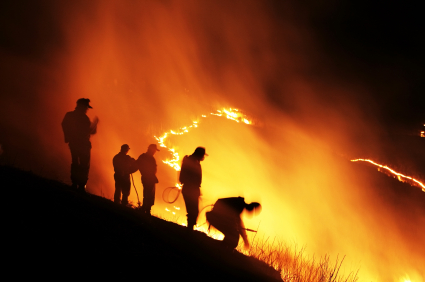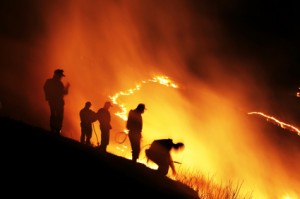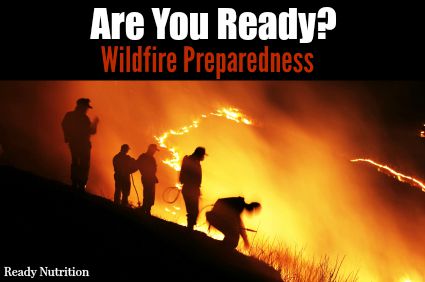 [1]With the severe droughts plaguing our country, California isn’t the only geographical area that needs to prepare for wildfires.
[1]With the severe droughts plaguing our country, California isn’t the only geographical area that needs to prepare for wildfires.
For example, due to extremely dry conditions in 2011, wildfires burned in many parts of the country, including the great state of Texas. By October 16, 2011, about 3,853,475 acres of Texas had burned in a single fire season, equivalent to a square of about 77.5 by 77.5 miles. During the 2015 wildfire season, residents of central Washington state are being threatened by several fires begun by lightning strikes that have grown into one massive fire. Alaska and British Columbia, Canada are also ablaze.
How do wildfires get started?
Wildfires often begin unnoticed, particularly if they originate in a remote area. They can be started by acts of nature or by the carelessness of man.
The four major natural causes of wildfire ignitions are:
- Lightning
- Volcanic eruption
- Sparks from rockfall
- Spontaneous combustion
Our current droughts and dry conditions greatly multiply the likelihood of wildfires from any of these sources.
Mankind is at fault for many of the wildfires that destroy thousands of wilderness acres. For example, the irresponsible use of fire in highly wooded areas dramatically increases the chance of a wildfire. These fires turn into firestorms and burn quickly – igniting brush, low-lying vegetation, organic materials, trees, and homes that spread into the surrounding community.
Before a Wildfire
Having a prepared community can lessen the chances of your neighborhood going up in flames. There are many ways to prepare homes and neighborhoods for wildfires. Use this checklist [2] to get your home and family prepared.
Ensure that you have a family preparedness plan, a first aid kit with items to treat burns, and a communications plan. FEMA recommends that you keep wildfire safety in mind [3]when you design and landscape your home. [3] They offer these tips to create a defensible space:
- Select materials and plants that can help contain fire rather than fuel it. For example, hardwood trees are less flammable than pine, evergreen, eucalyptus or fir trees.
- Use fire-resistant or incombustible materials on the roof and exterior structure of the dwelling
- Treat wood or combustible material used in roofs, siding, decking, or trim with fire-retardant chemicals evaluated by a nationally recognized laboratory.
- The immediate surroundings of your home should be clear of anything that would fuel a fire. This includes trees, long unkempt grass or weeds, woodpiles, and tarps.
- Have hoses long enough to reach all areas of your property. It goes without saying that these should be connected to a reliable water source.
Firewise.org offers more detailed information [4] about fortifying your home against wildfires.
During a Wildfire
Because emergency evacuations can come on suddenly, have an evacuation route planned and a 72-hour bag [5] packed for your family. If you are advised to evacuate, do so immediately. Watch and listen to radio or news announcements about changes in the speed and direction of the fire and smoke. Tell someone when you left and where you are going.
Never underestimate a wildfire. They can move sporadically and change courses suddenly, moving as fast as 14 miles per hour.
If you are not ordered to evacuate and have time to prepare your home, FEMA recommends you take the following actions:
- Arrange temporary housing at a friend or relative’s home outside the threatened area in case you need to evacuate.
- Wear protective clothing when outside – sturdy shoes, cotton or woolen clothes, long pants, a long-sleeved shirt, gloves and a handkerchief to protect your face.
- Gather fire tools such as a rake, axe, handsaw or chainsaw, bucket and shovel.
- Close outside attic, eaves and basement vents, windows, doors, pet doors, etc. Remove flammable drapes and curtains. Close all shutters, blinds or heavy non-combustible window coverings to reduce radiant heat.
- Close all doors inside the house to prevent draft. Open the damper on your fireplace, but close the fireplace screen.
- Shut off any natural gas, propane or fuel oil supplies at the source.
- Connect garden hoses to outdoor water faucet and fill any pools, hot tubs, garbage cans, tubs or other large containers with water.
- Place lawn sprinklers on the roof and near above-ground fuel tanks. Leave sprinklers on and dowsing these structures as long as possible.
- If you have gas-powered pumps for water, make sure they are fueled and ready.
- Place a ladder against the house in clear view.
- Disconnect any automatic garage door openers so that doors can still be opened by hand if the power goes out. Close all garage doors.
- Place valuable papers, mementos and anything “you can’t live without” inside the car in the garage, ready for quick departure. Any pets still with you should also be put in the car.
- Place valuables that will not be damaged by water in a pool or pond.
- Move flammable furniture into the center of the residence away from the windows and sliding-glass doors.
- Turn on outside lights and leave a light on in every room to make the house more visible in heavy smoke.
During last year’s massive King Fire, Daisy Luther wrote about the experience of being only a few miles [6] from the containment border of the blaze. She reported that a major issue during the fire was looters. As families prepared to evacuate and loaded their vehicles with their most prized possessions, thieves spend the evenings preying on them by stealing the things they had packed into their cars. As well, when evacuations occurred, residents returned to their homes afterward to discover that they’d been ransacked and robbed when no one was around.
Daisy and her family were on an evacuation alert for 11 stressful days. When asked by readers why she and her family didn’t evacuate, she wrote the following:
On day 11, someone asked me the very reasonable question of why we waited. Why, she wondered, didn’t we just evacuate? Wouldn’t it be less worrisome to watch from afar, in a place where our safety was cushioned by miles?
Not really.
First, when you’re away from home, you constantly wonder what’s going on AT home. While I am well aware there’s nothing we could do if the wildfire escaped its barriers and bore down on our home, until that point, I saw no reason to leave. I trusted that the firefighters would warn us as soon as we were at risk and that they’d err on the side of caution. The fire was now 93,000 acres, bigger than the city of Atlanta, and not one human life had been lost.
Secondly, we have several pets. If we needed to evacuate, we had a place to go. Dear friends had invited us and all of our animals to come and stay with them. We didn’t want to impose like that unless we had no choice.
Third – and this is something many people don’t think about – evacuation is expensive. Best case scenario, like us, you have friends or family with whom you can stay. But in many cases, people stay at shelters or hotels. Insurance may or may not reimburse you for your expenses, but either way, you have to put out the money first. Costs like hotel bills, laundry expenses, and dining out can add up very quickly, and if you don’t have a healthy emergency fund, it can cause serious financial hardship.
After a Wildfire
The aftermath of a wildfire can be a very confusing time. Always take precautions to ensure that there are no existing fires in your area. When you are safe, follow these listed suggestions.
- If there are burn victims present, or are a burn victim yourself, call 9-1-1 or seek medical attention immediately. If medical attention is delayed, cool and cover burns to reduce chance of further injury or infection. Don’t apply things like butter to a burn – just keep them cool and covered.
- If you remained at home, check the roof immediately after the fire danger has passed. Put out any roof fires, sparks or embers. Check the attic for hidden burning sparks.
- For several hours after the fire, maintain a “fire watch.” Re-check for smoke and sparks throughout the house.
- If you have evacuated, do not return home until fire officials say it is safe.
- If a building inspector has placed a color-coded sign on the home, do not enter it until you get more information. It’s important to understand exactly what the sign means and whether it is safe to enter your home.
- If you must leave your home because a building inspector says the building is unsafe, ask someone you trust to watch the property during your absence.
- Use caution when entering burned areas as hazards may still exist, including hot spots, which can flare up without warning.
- If you detect heat or smoke when entering a damaged building, evacuate immediately.
- If you have a safe or strong box, do not try to open it. It can hold intense heat for several hours. If the door is opened before the box has cooled, the contents could burst into flames.
- Avoid damaged or fallen power lines, poles and downed wires.
- Watch for ash pits and mark them for safety—warn family and neighbors to keep clear of the pits also.
- Watch animals closely and keep them under your direct control. Hidden embers and hot spots could burn your pets’ paws or hooves.
- Follow public health guidance on safe cleanup of fire ash and safe use of masks.
- Wet debris down to minimize breathing dust particles.
- Wear leather gloves and heavy soled shoes to protect hands and feet.
- Cleaning products, paint, batteries and damaged fuel containers need to be disposed of properly to avoid risk.
- Discard any food that has been exposed to heat, smoke or soot.
- Do NOT use water that could be contaminated to wash dishes, brush teeth, prepare food, wash hands, make ice, or make baby formula.
- Remain calm. Pace yourself. You may find yourself in the position of taking charge of other people. Listen carefully to what people are telling you, and deal patiently with urgent situations first.
Prep for wildfires before they start.
Ensuring that you have the necessary preparations in place should a blazing forest fire occur will help you diffuse some of the stress and panic caused by such an event.
While a wildfire is often an act of nature that can’t be predicted, there’s a lot you can do to prepare for them ahead of time. You can begin to take steps to prepare your community for this type of disaster by starting with your own home.

